人教版(2019)选择性必修第一册Unit 4 Body Language Discover useful structures课件(共35张)
文档属性
| 名称 | 人教版(2019)选择性必修第一册Unit 4 Body Language Discover useful structures课件(共35张) | 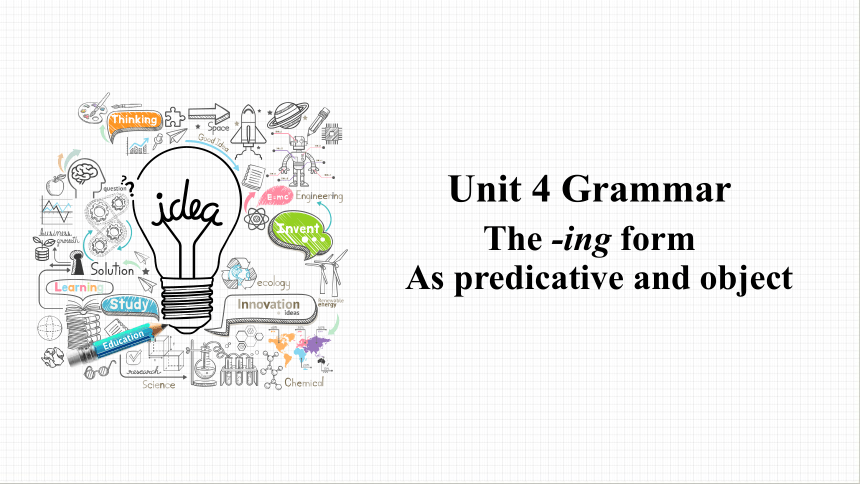 | |
| 格式 | pptx | ||
| 文件大小 | 931.5KB | ||
| 资源类型 | 教案 | ||
| 版本资源 | 人教版(2019) | ||
| 科目 | 英语 | ||
| 更新时间 | 2024-10-11 16:09:33 | ||
图片预览

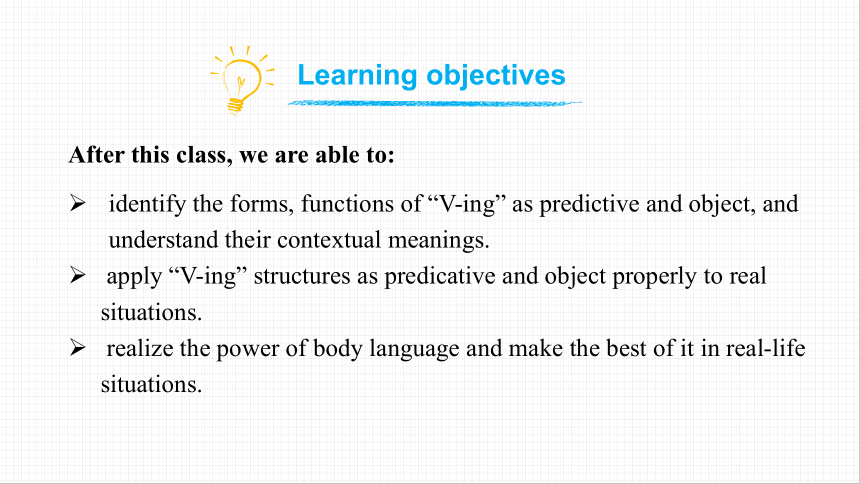
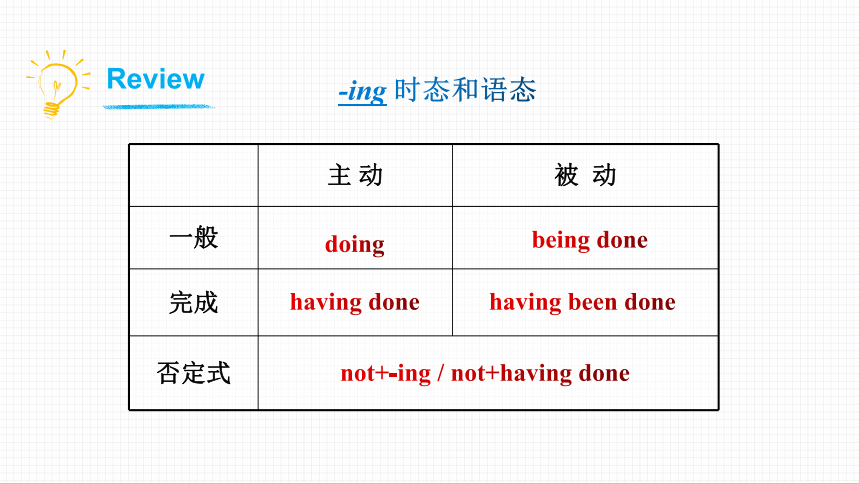
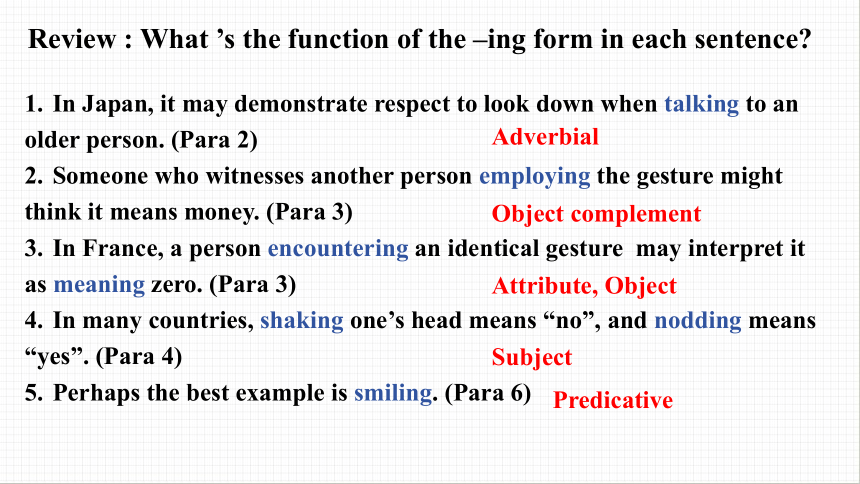
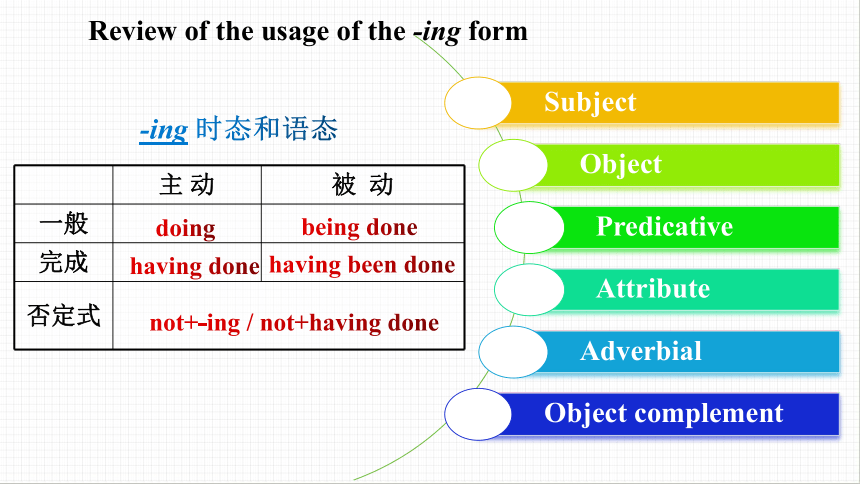
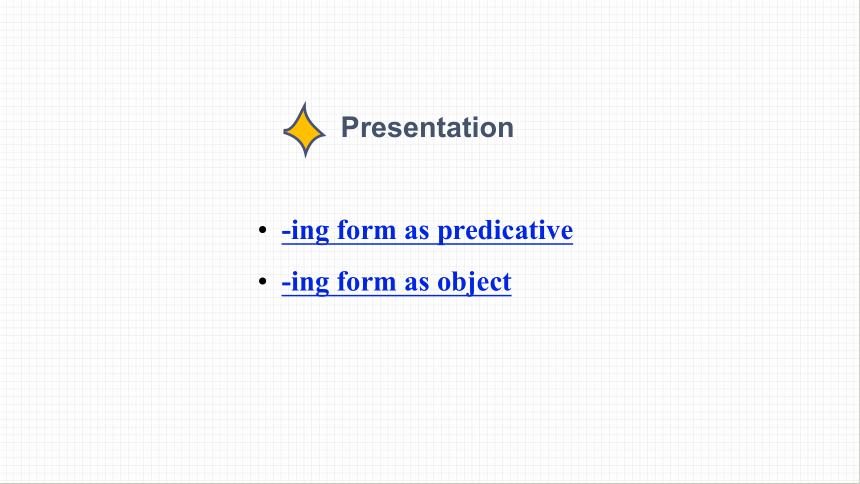
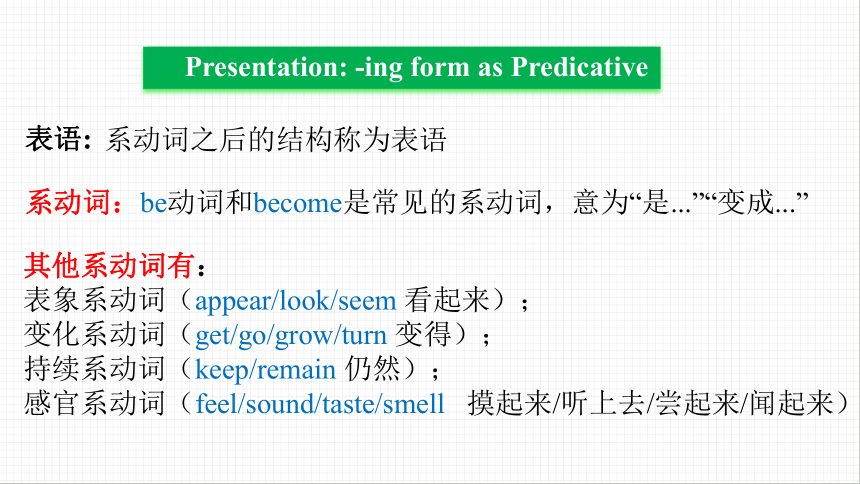
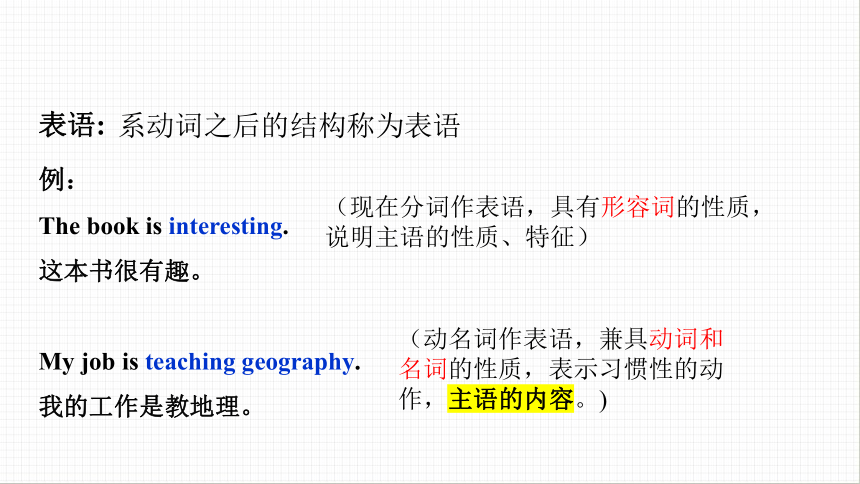
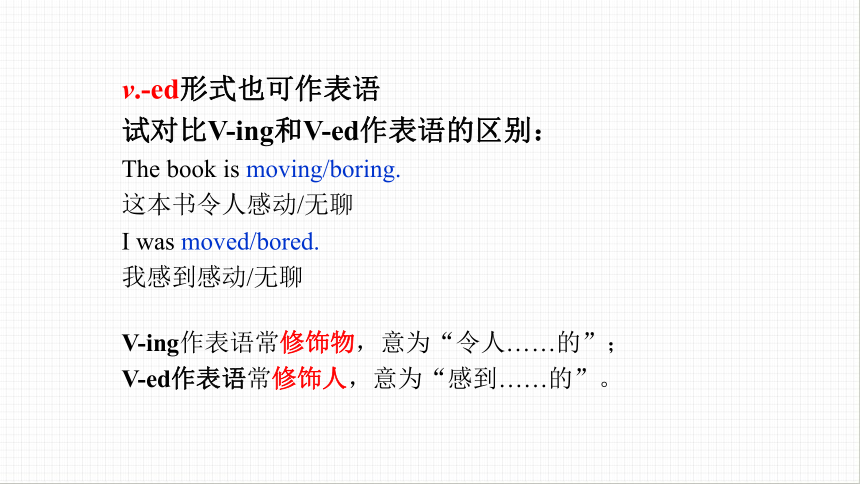
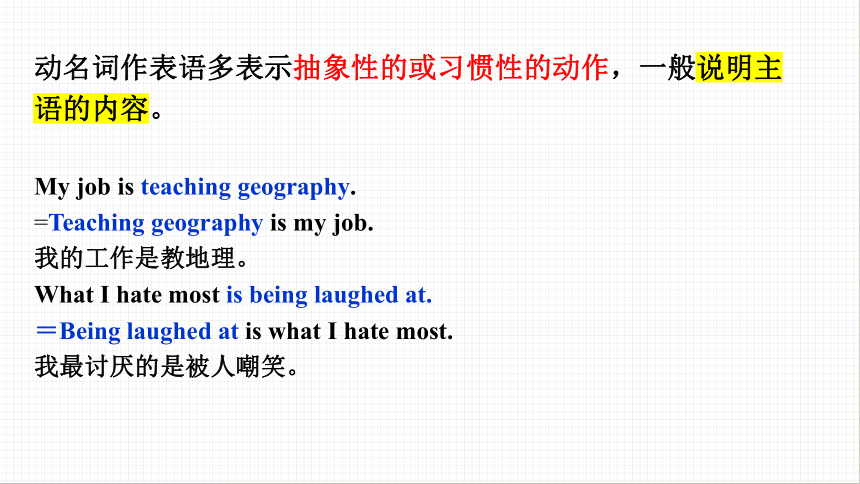
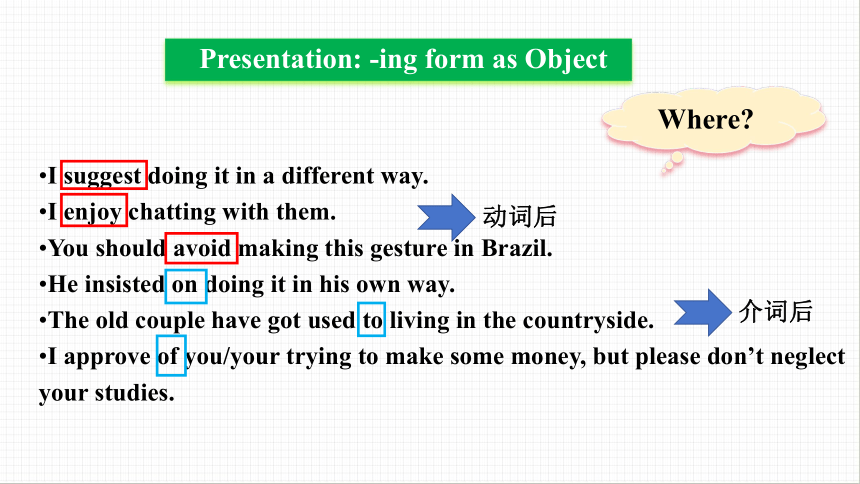
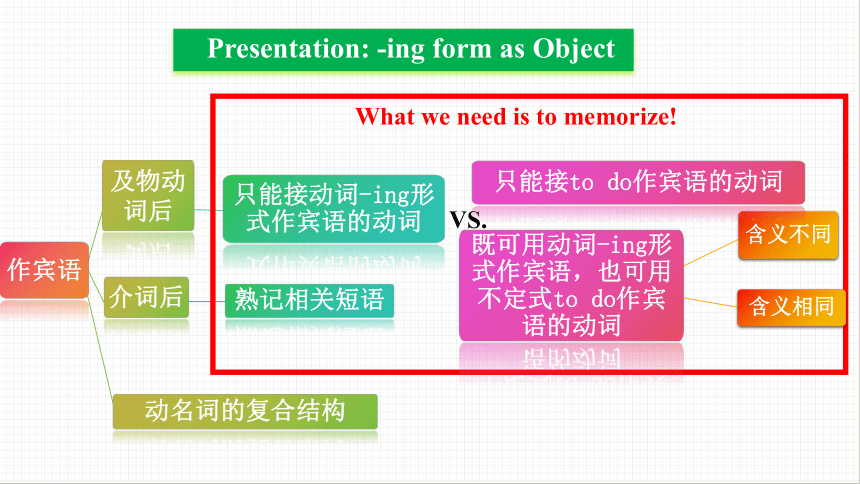
文档简介
(共35张PPT)
The -ing form
As predicative and object
Unit 4 Grammar
identify the forms, functions of “V-ing” as predictive and object, and understand their contextual meanings.
apply “V-ing” structures as predicative and object properly to real situations.
realize the power of body language and make the best of it in real-life situations.
After this class, we are able to:
Learning objectives
-ing 时态和语态
主 动 被 动
一般
完成
否定式
doing
being done
having done
having been done
not+-ing / not+having done
Review
Review : What ’s the function of the –ing form in each sentence
In Japan, it may demonstrate respect to look down when talking to an older person. (Para 2)
Someone who witnesses another person employing the gesture might think it means money. (Para 3)
In France, a person encountering an identical gesture may interpret it as meaning zero. (Para 3)
In many countries, shaking one’s head means “no”, and nodding means “yes”. (Para 4)
Perhaps the best example is smiling. (Para 6)
Adverbial
Object complement
Attribute, Object
Subject
Predicative
Subject
1
Object
2
Predicative
3
Attribute
4
Adverbial
5
Object complement
6
Review of the usage of the -ing form
-ing 时态和语态
主 动 被 动
一般
完成
否定式
doing
being done
having done
having been done
not+-ing / not+having done
-ing form as predicative
-ing form as object
Presentation
表语:
系动词之后的结构称为表语
系动词:be动词和become是常见的系动词,意为“是...”“变成...”
其他系动词有:
表象系动词(appear/look/seem 看起来);
变化系动词(get/go/grow/turn 变得);
持续系动词(keep/remain 仍然);
感官系动词(feel/sound/taste/smell 摸起来/听上去/尝起来/闻起来)
Presentation: -ing form as Predicative
例:
The book is interesting.
这本书很有趣。
My job is teaching geography.
我的工作是教地理。
(现在分词作表语,具有形容词的性质,说明主语的性质、特征)
(动名词作表语,兼具动词和名词的性质,表示习惯性的动作,主语的内容。)
表语:
系动词之后的结构称为表语
v. ed形式也可作表语
试对比V-ing和V-ed作表语的区别:
The book is moving/boring.
这本书令人感动/无聊
I was moved/bored.
我感到感动/无聊
V-ing作表语常修饰物,意为“令人……的”;
V-ed作表语常修饰人,意为“感到……的”。
动名词作表语多表示抽象性的或习惯性的动作,一般说明主语的内容。
My job is teaching geography.
=Teaching geography is my job.
我的工作是教地理。
What I hate most is being laughed at.
=Being laughed at is what I hate most.
我最讨厌的是被人嘲笑。
I suggest doing it in a different way.
I enjoy chatting with them.
You should avoid making this gesture in Brazil.
He insisted on doing it in his own way.
The old couple have got used to living in the countryside.
I approve of you/your trying to make some money, but please don’t neglect your studies.
Presentation: -ing form as Object
动词后
介词后
Where
Presentation: -ing form as Object
只能接动词-ing形式作宾语的动词
介词后
熟记相关短语
动名词的复合结构
VS.
及物动词后
作宾语
What we need is to memorize!
含义不同
含义相同
只能接to do作宾语的动词
既可用动词-ing形式作宾语,也可用不定式to do作宾语的动词
Memory time
1. 作及物动词的宾语
只能接-ing形式作宾语的动词
喜欢考虑要想象(enjoy, consider, imagine/fancy)
介意冒险可避免(mind, risk, avoid)
允许承认不喜欢(allow, admit, dislike)
欣赏错过可理解(appreciate, miss, understand)
主张完成不拖延(advocate, finish, delay/postpone)
建议坚持勤练习(suggest/advise/recommend, keep, practice)
反对逃避不放弃(oppose/resist, escape, quit)
1.作及物动词的宾语
只能接-ing形式作宾语的动词
喜欢考虑要想象(enjoy, consider, imagine/fancy)
介意冒险可避免(mind, risk, avoid)
允许承认不喜欢(allow/permit, admit, dislike)
欣赏错过可理解(appreciate, miss, understand)
主张完成不拖延(advocate, finish, delay/postpone)
建议坚持勤练习(suggest/advise/recommend, keep, practice)
反对逃避不放弃(oppose/resist, escape, quit)
Memory time
作介词宾语(常见短语)
insist on 坚持
put off 推迟
be opposed to
反对
look forward to 盼望
carry on 继续
pay attention to 注意
lead to 导致
be devoted to
致力于
get down to
着手做
be addicted to
沉迷
be used to
习惯于
contribute to
有助于
adjust to 适应
object to 反对
be equal to 胜任
Rule: 1 min for you to remember all the phrases and their positions.
Memory time
2.作介词宾语(常见短语)
be devoted to
致力于
insist on 坚持
be equal to 胜任
be addicted to 沉迷
be used to
习惯于
contribute to
有助于
put off 推迟
object to 反对
be opposed to 反对
get down to
着手做
look forward to
盼望
lead to 导致
pay attention to
注意
carry on 继续
adjust to 适应
Memory time
3.在allow、advise、forbid、permit后直接跟v. ing形式作宾语,如果有名词或代词作宾语,则构成“allow/advise/forbid/permit+名词/代词+不定式(宾语补足语)”形式。
◆Our teacher does not allow cheating to go unpunished.
我们的老师不允许作弊行为不受到惩罚。
◆He did not allow himself to be too upset by the news.
他没有因听到这个消息而使自己过于沮丧。
◆They don't permit smoking in the public.
他们不允许在公共场所吸烟。
◆Her mother doesn't permit her to stay away at night.
她母亲不允许她在外过夜。
区分:只能接to do形式作宾语的动词
desire to do sth
wish to do sth
expect to do sth
claim to do sth
dare to do sth
apply to do sth
agree to do sth
determine to do sth
decide to do sth
struggle to do sth
learn to do sth
refuse to do sth
decline to do sth
promise to do sth
attempt to do sth
prepare to do sth
hesitate to do sth
bother to do sth
pretend to do sth
tend to do sth
渴望做某事
希望做某事
期待做某事
声称要做某事
敢做某事
申请做某事
同意做某事
下定决心做某事
决定做某事
尽力做某事
学会做某事
拒绝做某事
拒绝做某事
承诺做某事
试图做某事
准备做某事
犹豫做某事
费心去做某事
假装做某事
倾向于做某事
不定式强调动作尚未发生,将来的动作
区分:既可用动词-ing形式作宾语,也可用不定式to do作宾语的动词
有些动词和动词短语后跟动词不定式和动名词作宾语皆可,但含义不同。
动词 宾语的形式 意义
forget to do 忘记做……
doing 忘记做过……
remember to do 记着要去做……
doing 记得做过……
regret to do 遗憾/抱歉要做……
doing 后悔做了……
try to do 尽力做……
doing 尝试做……
mean to do 打算做……
doing 意味着……
动词 宾语的形式 意义
go on to do 接着做(另外一件事)
doing 接着做(同一件事)
stop to do (作目的状语) 停下来去做某事
doing 停止做某事
单句语法填空
(1)I remembered __________(lock) the door before I left the office, but I forgot __________(turn) off the lights.
(2)I still remember __________(send) to school for the first time.
(3)After a long talk,the boy admitted ____________________(cheat) in the last exam.
(4)Don't forget __________(take) your umbrella in case it rains.
locking
to turn
being sent
cheating/having cheated
to take
区分:既可用动词-ing形式作宾语,也可用不定式to do作宾语的动词
need, require, want, demand, request, deserve
作“需要”解时,后面接-ing形式的主动形式或不定式的被动形式,意义上并无差别。
Your composition needs correcting/ to be corrected.
His coat wants cleaning /to be cleaned.
The computer needs repairing(主动)=needs to be repaired.
(sth.) need/want/require/deserve/request/demand doing
= to be done 某物需要被做
Presentation: 动名词的复合结构作宾语
名词
名词所有格
代词宾格
形容词性物主代词
名词
名词
所有格
代词
宾格
形容词性
物主代词
动名词的复合结构
动词-ing形式
逻辑主语
+
=
I approve of you/your trying to make some money, but please don’t neglect your studies.
你介意打开窗户吗?
你介意我打开窗户吗?
你介意Marissa打开窗户吗?
Would you mind Marissa/Marissa’s opening the window
Would you mind opening the window
Would you mind me/my opening the window
注意:当动名词的复合结构做主语时,逻辑主语只能用名词所有格或形容词性物主代词
单句语法填空
(1)My hobby is __________(sit) on the beach, staring at the blue sky.
(2)The purpose of the meeting is ________(elect) a new captain.
(3)The speech you delivered was __________(inspire) and touched my heart.
sitting
to elect
inspiring
Ⅰ.单句语法填空
1.He cares little about ___________(spend) money on himself and leads a comfortable life.
2.The key to successful small talk is ___________(learn) how to connect with others, not just communicate with them.
3.My father suggested ___________(read) more books in my spare time.
spending
learning
reading
4.Some of the children are shy and they have some difficulty ___________(make) friends.
5.I still remember ______________(invite) to dinner in Kitty's house when I was only five years old.
6.As far as I'm concerned, the result is very ____________(disappoint).
7.However, the tourists insist on ___________(keep) to their plan.
making
being invited
disappointing
keeping
8.The movie was really ___________(terrify), and everybody was very shocked.
9.Little Alice looked forward to ___________(stay) with her grandparents in the countryside.
10.The little boy stopped ___________(cry) when he saw the new toy car and began to play with it happily.
11.To avoid _____________(see) by the teacher, Tony stole into the classroom by the back door.
12.The committee permitted us _____ _(go) ahead with our building plan.
terrifying
staying
crying
being seen
to go
含义不同
含义相同
只能接to do作宾语的动词
既可用动词-ing形式作宾语,也可用不定式to do作宾语的动词
及物动词后
只能接动词-ing形式作宾语的动词
介词后
熟记相关短语
动名词的复合结构
做题技巧
1.看题划关键词
2.判断动词与逻辑主语的关系(主被动)
3.准确拼写
VS.
作表语
主语内容
主语和表语可互换位置
主语性质
作宾语
动词-ing形式
Summary
amuse teach break down call on bow get through assess
1. Bill’s job is ________ sign language.
2. The theme of his presentation is _____________ barriers between groups.
3. By _______, we mean “bending our head or body forward as a sign of respect
or shame”.
4. _____________ three kilometres of heavy traffic took me almost 25 minutes.
5. We intended to visit the theme park but ended up _________ Professor Zhang.
teaching
breaking down
bowing
Getting through
calling on
Complete the sentences using the -ing form of the words and phrases in the box. Two are extra. Then state their functions.
predicative
predicative
object
subject
adverbial
Practice
Read the passage. Underline and correct the mistakes.
Body language is as important as words in communicate with other people. The crucial factor is recognise the fact that body language differs in various cultures, but it is also
important to “do in Rome as the Romans do”. For example, show the gesture for “OK” in many cultures can meaning “money” in Japan or “zero” in France. By contrast,
make such a gesture in Brazil or Germany can being offensive.
Of course, some body language is sharing by all cultures. For instance, waved one’s
hand while see your friend off is like to say “Good-bye”, and smile often gets people
through difficult situations.
communicating
recognising
showing
mean
making
be
shared
waving
seeing
saying
smiling
Workbook
Workbook
Complete the conversation by translating the Chinese words into English. Use the -ing form if possible.
Rose (R) is asking school counsellor Casey (C) about body language.
R: How will I know if someone isn’t interested in what I’m saying
C: Although body language is not the same for everyone, there are a few general
signs you can look for, such as lack of eye contact, being distracted,
____________________ (看天花板) or other things like a cell phone, their
body and feet turning away from you, or __________________________ (突
然改变主意). You could also simply ask if the topic isn’t interesting or
change the subject by ____________________ (问一个问题). For example,
“Anyway, that’s enough about my trip; what did you end up doing this
weekend ”
looking at the ceiling
suddenly changing their mind
asking a question
R: What does it mean if someone looks at me all the time
C: That may mean the person likes you or is interested in ________________
________ (逐步认识你). That type of look usually means _____________
_____________ (请你接着说下去).
R: What does it mean if a person stretches their neck
C: It could just mean that their neck needs ________ (伸展). On the other hand,
it could also be a sign of ______________________ (感到不舒服) with the
current situation. A person ___________________ (经历焦躁) can also act
similarly.
R: What sort of body language can show that someone is lying
C: This may vary from person to person. Some people would avoid__________
________ (凝视你的双眼) . Others would also shift their bodies, adjust their
clothing, or play with their hair.
gradually getting to
know you
waiting for you
to go on talking
stretching
feeling uncomfortable
experiencing anxiety
staring at
your eyes
Complete the passage with the correct forms of the words and phrases in the box. Can you add more examples to explain how you read body language
lie challenge consider individual differences maintain
consider the whole picture evaluate a patient’s condition
Reading body language is not an easy task. It can be __________ because interpreting the signs that another shows requires ____________________________. In this sense, it can be compared to a doctor ___________________________.
______________________________ is also key to reading people’s body language
accurately. For example, when ______, some people avoid eye contact. By contrast,
others may ________ eye contact even longer than usual.
challenging
considering the whole picture
evaluating a patient’s condition
Considering individual differences
lying
maintain
It was an unpopular decision to postpone ______________ (build) the new hospital.
One learns a language by making mistakes and __________ (correct) them.
Though it sounds a bit too expensive, it is worth ______________ (buy).
She is very busy ________ (write) her papers. She is far too busy _________(receive) callers.
Once you are addicted to________ (smoke), you may find it difficult for you to quit.
Something is wrong with the computer and it requires_________________ (repair).
I appreciate his _________(devote) himself to the cause of agriculture.
She can’t stand __________ (keep) waiting.
He always imagine ________(find) a wallet on the sidewalk.
The little boy slipped into the classroom without __________ (notice) by the teacher.
Tony Blair had stood fast in ___________(back) the US in its war against terrorism.
Peter is angry about ________________(not invite) to the party.
The black people in the US are opposed to _____________(treat) unfairly.
Task 1 Train game
building
being treated
not being invited
backing
finding
keeping
writing
devoting
repairing/to be repaired
to receive
buying
correcting
being noticed
smoking
Consolidation
Task 2 Use -ing form to complete the following sentences.
1.我不记得他给过我这本书。
I don’t remember_________________________.
2.比尔建议召开一个会议,讨论假期期间为贫困的人做些什么。
Bill suggested _______________________________for the poor during the vacation.
3.感谢你告诉了我这一消息。
I appreciate ______________________.
4.我们终于克服了所有的困难。
We succeeded ______________________________.
5.他说的话很让人信服,所以我们可以相信他并和他做生意。
_____________________________, so we can trust him and do business with him.
6.我的职责是教你如何学习。
My duty is __________________________.
him/his giving me this book
holding a meeting on what to do
you telling me the news
(in) overcoming all the difficulties
What he says is very convincing
teaching you how to study
The -ing form
As predicative and object
Unit 4 Grammar
identify the forms, functions of “V-ing” as predictive and object, and understand their contextual meanings.
apply “V-ing” structures as predicative and object properly to real situations.
realize the power of body language and make the best of it in real-life situations.
After this class, we are able to:
Learning objectives
-ing 时态和语态
主 动 被 动
一般
完成
否定式
doing
being done
having done
having been done
not+-ing / not+having done
Review
Review : What ’s the function of the –ing form in each sentence
In Japan, it may demonstrate respect to look down when talking to an older person. (Para 2)
Someone who witnesses another person employing the gesture might think it means money. (Para 3)
In France, a person encountering an identical gesture may interpret it as meaning zero. (Para 3)
In many countries, shaking one’s head means “no”, and nodding means “yes”. (Para 4)
Perhaps the best example is smiling. (Para 6)
Adverbial
Object complement
Attribute, Object
Subject
Predicative
Subject
1
Object
2
Predicative
3
Attribute
4
Adverbial
5
Object complement
6
Review of the usage of the -ing form
-ing 时态和语态
主 动 被 动
一般
完成
否定式
doing
being done
having done
having been done
not+-ing / not+having done
-ing form as predicative
-ing form as object
Presentation
表语:
系动词之后的结构称为表语
系动词:be动词和become是常见的系动词,意为“是...”“变成...”
其他系动词有:
表象系动词(appear/look/seem 看起来);
变化系动词(get/go/grow/turn 变得);
持续系动词(keep/remain 仍然);
感官系动词(feel/sound/taste/smell 摸起来/听上去/尝起来/闻起来)
Presentation: -ing form as Predicative
例:
The book is interesting.
这本书很有趣。
My job is teaching geography.
我的工作是教地理。
(现在分词作表语,具有形容词的性质,说明主语的性质、特征)
(动名词作表语,兼具动词和名词的性质,表示习惯性的动作,主语的内容。)
表语:
系动词之后的结构称为表语
v. ed形式也可作表语
试对比V-ing和V-ed作表语的区别:
The book is moving/boring.
这本书令人感动/无聊
I was moved/bored.
我感到感动/无聊
V-ing作表语常修饰物,意为“令人……的”;
V-ed作表语常修饰人,意为“感到……的”。
动名词作表语多表示抽象性的或习惯性的动作,一般说明主语的内容。
My job is teaching geography.
=Teaching geography is my job.
我的工作是教地理。
What I hate most is being laughed at.
=Being laughed at is what I hate most.
我最讨厌的是被人嘲笑。
I suggest doing it in a different way.
I enjoy chatting with them.
You should avoid making this gesture in Brazil.
He insisted on doing it in his own way.
The old couple have got used to living in the countryside.
I approve of you/your trying to make some money, but please don’t neglect your studies.
Presentation: -ing form as Object
动词后
介词后
Where
Presentation: -ing form as Object
只能接动词-ing形式作宾语的动词
介词后
熟记相关短语
动名词的复合结构
VS.
及物动词后
作宾语
What we need is to memorize!
含义不同
含义相同
只能接to do作宾语的动词
既可用动词-ing形式作宾语,也可用不定式to do作宾语的动词
Memory time
1. 作及物动词的宾语
只能接-ing形式作宾语的动词
喜欢考虑要想象(enjoy, consider, imagine/fancy)
介意冒险可避免(mind, risk, avoid)
允许承认不喜欢(allow, admit, dislike)
欣赏错过可理解(appreciate, miss, understand)
主张完成不拖延(advocate, finish, delay/postpone)
建议坚持勤练习(suggest/advise/recommend, keep, practice)
反对逃避不放弃(oppose/resist, escape, quit)
1.作及物动词的宾语
只能接-ing形式作宾语的动词
喜欢考虑要想象(enjoy, consider, imagine/fancy)
介意冒险可避免(mind, risk, avoid)
允许承认不喜欢(allow/permit, admit, dislike)
欣赏错过可理解(appreciate, miss, understand)
主张完成不拖延(advocate, finish, delay/postpone)
建议坚持勤练习(suggest/advise/recommend, keep, practice)
反对逃避不放弃(oppose/resist, escape, quit)
Memory time
作介词宾语(常见短语)
insist on 坚持
put off 推迟
be opposed to
反对
look forward to 盼望
carry on 继续
pay attention to 注意
lead to 导致
be devoted to
致力于
get down to
着手做
be addicted to
沉迷
be used to
习惯于
contribute to
有助于
adjust to 适应
object to 反对
be equal to 胜任
Rule: 1 min for you to remember all the phrases and their positions.
Memory time
2.作介词宾语(常见短语)
be devoted to
致力于
insist on 坚持
be equal to 胜任
be addicted to 沉迷
be used to
习惯于
contribute to
有助于
put off 推迟
object to 反对
be opposed to 反对
get down to
着手做
look forward to
盼望
lead to 导致
pay attention to
注意
carry on 继续
adjust to 适应
Memory time
3.在allow、advise、forbid、permit后直接跟v. ing形式作宾语,如果有名词或代词作宾语,则构成“allow/advise/forbid/permit+名词/代词+不定式(宾语补足语)”形式。
◆Our teacher does not allow cheating to go unpunished.
我们的老师不允许作弊行为不受到惩罚。
◆He did not allow himself to be too upset by the news.
他没有因听到这个消息而使自己过于沮丧。
◆They don't permit smoking in the public.
他们不允许在公共场所吸烟。
◆Her mother doesn't permit her to stay away at night.
她母亲不允许她在外过夜。
区分:只能接to do形式作宾语的动词
desire to do sth
wish to do sth
expect to do sth
claim to do sth
dare to do sth
apply to do sth
agree to do sth
determine to do sth
decide to do sth
struggle to do sth
learn to do sth
refuse to do sth
decline to do sth
promise to do sth
attempt to do sth
prepare to do sth
hesitate to do sth
bother to do sth
pretend to do sth
tend to do sth
渴望做某事
希望做某事
期待做某事
声称要做某事
敢做某事
申请做某事
同意做某事
下定决心做某事
决定做某事
尽力做某事
学会做某事
拒绝做某事
拒绝做某事
承诺做某事
试图做某事
准备做某事
犹豫做某事
费心去做某事
假装做某事
倾向于做某事
不定式强调动作尚未发生,将来的动作
区分:既可用动词-ing形式作宾语,也可用不定式to do作宾语的动词
有些动词和动词短语后跟动词不定式和动名词作宾语皆可,但含义不同。
动词 宾语的形式 意义
forget to do 忘记做……
doing 忘记做过……
remember to do 记着要去做……
doing 记得做过……
regret to do 遗憾/抱歉要做……
doing 后悔做了……
try to do 尽力做……
doing 尝试做……
mean to do 打算做……
doing 意味着……
动词 宾语的形式 意义
go on to do 接着做(另外一件事)
doing 接着做(同一件事)
stop to do (作目的状语) 停下来去做某事
doing 停止做某事
单句语法填空
(1)I remembered __________(lock) the door before I left the office, but I forgot __________(turn) off the lights.
(2)I still remember __________(send) to school for the first time.
(3)After a long talk,the boy admitted ____________________(cheat) in the last exam.
(4)Don't forget __________(take) your umbrella in case it rains.
locking
to turn
being sent
cheating/having cheated
to take
区分:既可用动词-ing形式作宾语,也可用不定式to do作宾语的动词
need, require, want, demand, request, deserve
作“需要”解时,后面接-ing形式的主动形式或不定式的被动形式,意义上并无差别。
Your composition needs correcting/ to be corrected.
His coat wants cleaning /to be cleaned.
The computer needs repairing(主动)=needs to be repaired.
(sth.) need/want/require/deserve/request/demand doing
= to be done 某物需要被做
Presentation: 动名词的复合结构作宾语
名词
名词所有格
代词宾格
形容词性物主代词
名词
名词
所有格
代词
宾格
形容词性
物主代词
动名词的复合结构
动词-ing形式
逻辑主语
+
=
I approve of you/your trying to make some money, but please don’t neglect your studies.
你介意打开窗户吗?
你介意我打开窗户吗?
你介意Marissa打开窗户吗?
Would you mind Marissa/Marissa’s opening the window
Would you mind opening the window
Would you mind me/my opening the window
注意:当动名词的复合结构做主语时,逻辑主语只能用名词所有格或形容词性物主代词
单句语法填空
(1)My hobby is __________(sit) on the beach, staring at the blue sky.
(2)The purpose of the meeting is ________(elect) a new captain.
(3)The speech you delivered was __________(inspire) and touched my heart.
sitting
to elect
inspiring
Ⅰ.单句语法填空
1.He cares little about ___________(spend) money on himself and leads a comfortable life.
2.The key to successful small talk is ___________(learn) how to connect with others, not just communicate with them.
3.My father suggested ___________(read) more books in my spare time.
spending
learning
reading
4.Some of the children are shy and they have some difficulty ___________(make) friends.
5.I still remember ______________(invite) to dinner in Kitty's house when I was only five years old.
6.As far as I'm concerned, the result is very ____________(disappoint).
7.However, the tourists insist on ___________(keep) to their plan.
making
being invited
disappointing
keeping
8.The movie was really ___________(terrify), and everybody was very shocked.
9.Little Alice looked forward to ___________(stay) with her grandparents in the countryside.
10.The little boy stopped ___________(cry) when he saw the new toy car and began to play with it happily.
11.To avoid _____________(see) by the teacher, Tony stole into the classroom by the back door.
12.The committee permitted us _____ _(go) ahead with our building plan.
terrifying
staying
crying
being seen
to go
含义不同
含义相同
只能接to do作宾语的动词
既可用动词-ing形式作宾语,也可用不定式to do作宾语的动词
及物动词后
只能接动词-ing形式作宾语的动词
介词后
熟记相关短语
动名词的复合结构
做题技巧
1.看题划关键词
2.判断动词与逻辑主语的关系(主被动)
3.准确拼写
VS.
作表语
主语内容
主语和表语可互换位置
主语性质
作宾语
动词-ing形式
Summary
amuse teach break down call on bow get through assess
1. Bill’s job is ________ sign language.
2. The theme of his presentation is _____________ barriers between groups.
3. By _______, we mean “bending our head or body forward as a sign of respect
or shame”.
4. _____________ three kilometres of heavy traffic took me almost 25 minutes.
5. We intended to visit the theme park but ended up _________ Professor Zhang.
teaching
breaking down
bowing
Getting through
calling on
Complete the sentences using the -ing form of the words and phrases in the box. Two are extra. Then state their functions.
predicative
predicative
object
subject
adverbial
Practice
Read the passage. Underline and correct the mistakes.
Body language is as important as words in communicate with other people. The crucial factor is recognise the fact that body language differs in various cultures, but it is also
important to “do in Rome as the Romans do”. For example, show the gesture for “OK” in many cultures can meaning “money” in Japan or “zero” in France. By contrast,
make such a gesture in Brazil or Germany can being offensive.
Of course, some body language is sharing by all cultures. For instance, waved one’s
hand while see your friend off is like to say “Good-bye”, and smile often gets people
through difficult situations.
communicating
recognising
showing
mean
making
be
shared
waving
seeing
saying
smiling
Workbook
Workbook
Complete the conversation by translating the Chinese words into English. Use the -ing form if possible.
Rose (R) is asking school counsellor Casey (C) about body language.
R: How will I know if someone isn’t interested in what I’m saying
C: Although body language is not the same for everyone, there are a few general
signs you can look for, such as lack of eye contact, being distracted,
____________________ (看天花板) or other things like a cell phone, their
body and feet turning away from you, or __________________________ (突
然改变主意). You could also simply ask if the topic isn’t interesting or
change the subject by ____________________ (问一个问题). For example,
“Anyway, that’s enough about my trip; what did you end up doing this
weekend ”
looking at the ceiling
suddenly changing their mind
asking a question
R: What does it mean if someone looks at me all the time
C: That may mean the person likes you or is interested in ________________
________ (逐步认识你). That type of look usually means _____________
_____________ (请你接着说下去).
R: What does it mean if a person stretches their neck
C: It could just mean that their neck needs ________ (伸展). On the other hand,
it could also be a sign of ______________________ (感到不舒服) with the
current situation. A person ___________________ (经历焦躁) can also act
similarly.
R: What sort of body language can show that someone is lying
C: This may vary from person to person. Some people would avoid__________
________ (凝视你的双眼) . Others would also shift their bodies, adjust their
clothing, or play with their hair.
gradually getting to
know you
waiting for you
to go on talking
stretching
feeling uncomfortable
experiencing anxiety
staring at
your eyes
Complete the passage with the correct forms of the words and phrases in the box. Can you add more examples to explain how you read body language
lie challenge consider individual differences maintain
consider the whole picture evaluate a patient’s condition
Reading body language is not an easy task. It can be __________ because interpreting the signs that another shows requires ____________________________. In this sense, it can be compared to a doctor ___________________________.
______________________________ is also key to reading people’s body language
accurately. For example, when ______, some people avoid eye contact. By contrast,
others may ________ eye contact even longer than usual.
challenging
considering the whole picture
evaluating a patient’s condition
Considering individual differences
lying
maintain
It was an unpopular decision to postpone ______________ (build) the new hospital.
One learns a language by making mistakes and __________ (correct) them.
Though it sounds a bit too expensive, it is worth ______________ (buy).
She is very busy ________ (write) her papers. She is far too busy _________(receive) callers.
Once you are addicted to________ (smoke), you may find it difficult for you to quit.
Something is wrong with the computer and it requires_________________ (repair).
I appreciate his _________(devote) himself to the cause of agriculture.
She can’t stand __________ (keep) waiting.
He always imagine ________(find) a wallet on the sidewalk.
The little boy slipped into the classroom without __________ (notice) by the teacher.
Tony Blair had stood fast in ___________(back) the US in its war against terrorism.
Peter is angry about ________________(not invite) to the party.
The black people in the US are opposed to _____________(treat) unfairly.
Task 1 Train game
building
being treated
not being invited
backing
finding
keeping
writing
devoting
repairing/to be repaired
to receive
buying
correcting
being noticed
smoking
Consolidation
Task 2 Use -ing form to complete the following sentences.
1.我不记得他给过我这本书。
I don’t remember_________________________.
2.比尔建议召开一个会议,讨论假期期间为贫困的人做些什么。
Bill suggested _______________________________for the poor during the vacation.
3.感谢你告诉了我这一消息。
I appreciate ______________________.
4.我们终于克服了所有的困难。
We succeeded ______________________________.
5.他说的话很让人信服,所以我们可以相信他并和他做生意。
_____________________________, so we can trust him and do business with him.
6.我的职责是教你如何学习。
My duty is __________________________.
him/his giving me this book
holding a meeting on what to do
you telling me the news
(in) overcoming all the difficulties
What he says is very convincing
teaching you how to study
